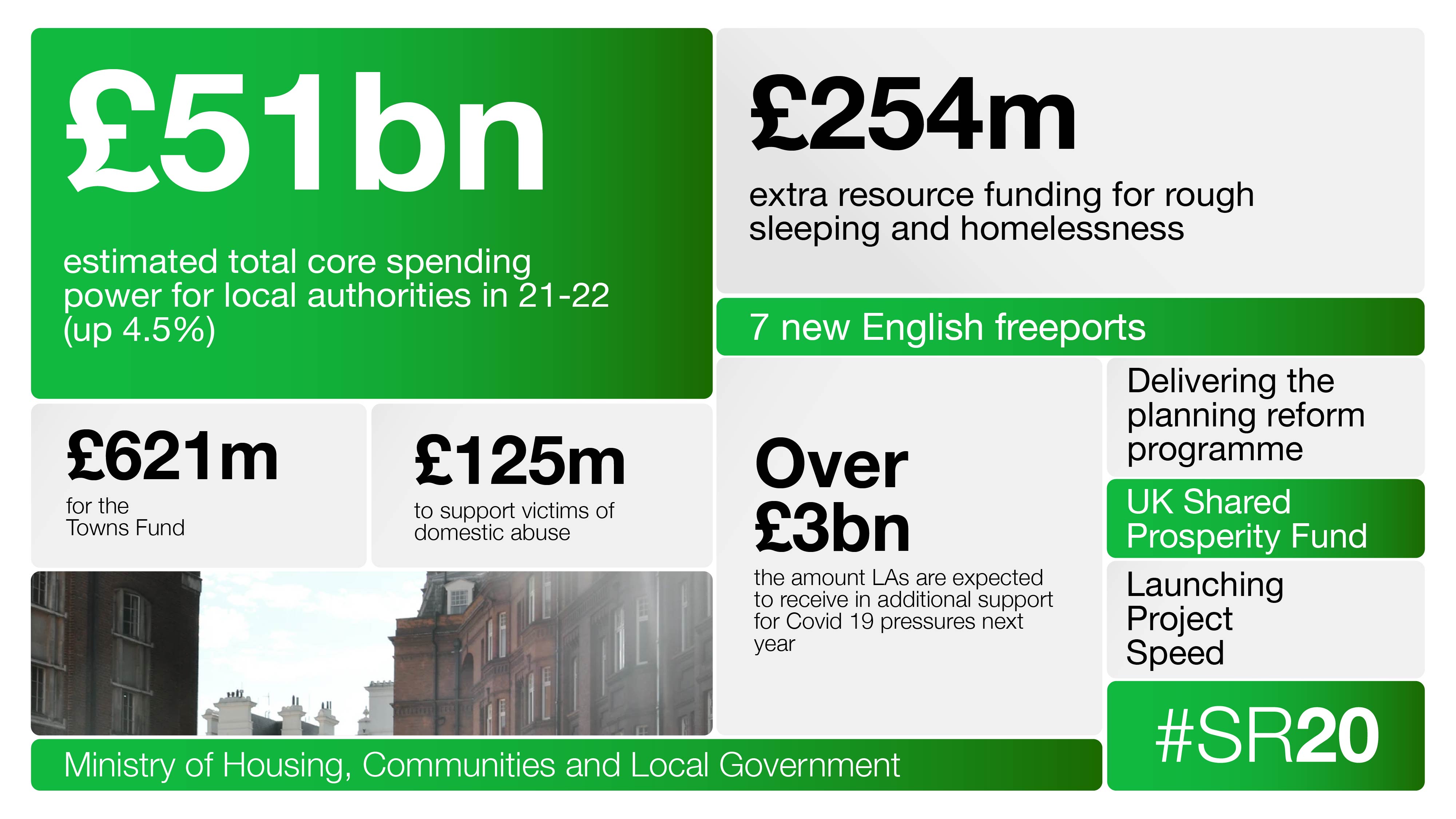£100 billion capital Spending Review includes infrastructure to drive UK’s recovery and support jobs

Delivering the #SR20 Spending Review, @RishiSunak said his immediate priority was to protect people’s lives and livelihoods as the country continues to battle the outbreak – allocating £55 billion to tackle the virus next year.
The Chancellor also announced how the government would deliver the next stages of its record investment plans in infrastructure to drive the UK’s recovery and level up for a greener, stronger future with £100 billion of capital spending next year and a £4 billion Levelling Up Fund.
Throughout the pandemic the government have provided an unprecedented economic support package to protect and create jobs.
The Spending Review builds on this by investing an additional £3.6 billion to build on commitments made in the Plan for Jobs.
This includes the new 3-year £2.9 billion Restart scheme to help more than one million unemployed people find work.
 Setting out the budgets for government departments and devolved administrations’ block grants for 2021/21, the Chancellor of the Exchequer Rishi Sunak said:
Setting out the budgets for government departments and devolved administrations’ block grants for 2021/21, the Chancellor of the Exchequer Rishi Sunak said:
“Today’s Spending Review delivers on the priorities of the British people. Our health emergency is not yet over, and the economic emergency has only just begun; so our immediate priority is to protect people’s lives and livelihoods.
“But today’s Spending Review also delivers stronger public services – paying for new hospitals, better schools and safer streets. And it delivers a once-in-a-generation investment in infrastructure. Creating jobs, growing the economy, and increasing pride in the places people call home.”
Sector Response:
Education, Jobs & Skills
 Education Secretary Gavin Williamson said:
Education Secretary Gavin Williamson said:
“This is the best real terms settlement for education in more than 10 years and provides the Department with £76bn to take forward the Government’s commitment to levelling up education, training and care for everyone, whatever their background.
“This money will allow us to change the lives of young people by increasing the core schools budget by £2.2bn – equivalent to a minimum of £5,150 per secondary pupil and £4,000 per primary pupil, rebuilding 500 schools over the next ten years, investing £291m in further education to help young people get the skills they and the country need, and much more.
“It also means we carry on delivering on our £1bn catch up package, including £350m to extend the success of the recently launched National Tutoring Programme for another year and make sure a pupil’s circumstances aren’t a barrier to getting the support they need to unlock their potential.”
 Kirstie Donnelly MBE, CEO at City & Guilds Group, said:
Kirstie Donnelly MBE, CEO at City & Guilds Group, said:
“Whilst it is positive to hear that the Government has placed protecting jobs and health front and centre of today’s announcement, what should set alarm bells ringing in the corridors of power is the OBR’s prediction of 2.6m unemployed in the UK next year. Re-focusing existing funding is sensible right now, but the Restart programme feels backward-looking in scope and lacks any detail about how we’re going to support people to retrain and reskill now.
“It would serve no one, least of all those trying to get back to work, to see a rehash of the unsuccessful Work Programme. In order to get to grips with this unprecedented crisis, what we need are more creative and practical strategies designed to tackle today’s issues, to get away from a top down, one-size-fits all approach and listen to the ideas and needs of local regions, and we need immediate action. If it’s going to be crunch time for unemployment in six months, can we afford to let people wait 12 months before giving them the support they need? The most practical step that we can take is to match skills to jobs, and supply to demand.
“In our ‘Act Now’ report published last month, we called on the Government to prioritise working with local authorities and businesses to create a national network of ‘Employment and Training Hubs’ within the regions most impacted by unemployment. These will act as a ‘one-stop-skills-and-jobs-shop’ to support reskilling back into meaningful employment in areas where its most needed. Providing people with the right support and framework to gain the necessary skills, advice and access to get back into work is critical for individuals and businesses, and will also save the public purse billions in benefits payments if people remain in work. There is no more time for discussion; we need to act now.”
 Dr Neil Bentley-Gockmann OBE, Chief Executive, WorldSkills UK said:
Dr Neil Bentley-Gockmann OBE, Chief Executive, WorldSkills UK said:
“Today’s announcements from the Chancellor reaffirm the Government’s understanding that investing in skills is key to driving the country’s recovery. We welcome investment in the Lifetime Skills Guarantee and extensions to the Kickstart Scheme and apprenticeship incentive scheme to make sure as many people as possible can find a route to develop high quality skills in the short term.
“But to get the economy motoring again, as a driver for growth and creation of jobs and apprenticeships, the pace of implementation of plans for infrastructure development, the green industrial revolution and innovation will be vital to create employer demand in key sectors for high-quality skills.
“The upcoming FE White Paper in England and the UK industrial strategy refresh are therefore essential, but currently missing, jigsaw pieces for creating not just a skills-led recovery, but also putting in place sustainable foundations for the longer-term creation of a world-beating skills system.
“This is crucial to boost business productivity and competitiveness, which will help attract international investment to all parts of the UK, driving inclusive growth and offering the next generation the prospect of a rewarding future.
“WorldSkills UK stands ready to play its part to improve further the quality of technical education and apprenticeships by continuing to work with UK and international partners to mainstream excellence in skills, bringing global best practice back to the UK to help more young people and the economy to succeed.”
 Association of Employment and Learning Providers managing director Jane Hickie said,
Association of Employment and Learning Providers managing director Jane Hickie said,
“We know the pressures on the public finances are huge and we welcome the employer incentives for apprenticeships, but AELP remains very concerned that without wage subsidies, apprenticeship opportunities are going to remain scarce when Kickstart appears more attractive to employers and young people.”
“We need to see the details behind the other apprenticeship measures before we comment in detail, but we hope that the levy transfer scheme isn’t regarded as a panacea for funding the apprenticeships of smaller businesses.”
 Tom Bewick, Chief Executive of the Federation of Awarding Bodies (FAB) said:
Tom Bewick, Chief Executive of the Federation of Awarding Bodies (FAB) said:
“The overall feeling in FE from today will be that the White Paper is probably not going to be the ‘revolution’ in investment that was perhaps first anticipated. The Chancellor has simply reheated skills announcements already made. While this investment should be welcomed, of course, it still falls far short from the real terms decline in post-16 funding that has taken place since 2010.
“If anything, what the government has reaffirmed today is that the skills strategy will continue to have to play second fiddle to its welfare to work plans, where more money will be spent next year by DWP to keep a lid on the jobless figures. It’s clear to me that DfE ministers have been less successful in this spending round than was hoped.”
 AoC’s Chief Executive David Hughes said:
AoC’s Chief Executive David Hughes said:
“The much anticipated spending review was of course focussed on the big dents to the economy caused by coronavirus and the subsequent enormous impact on government borrowing. There was more in the announcement for colleges than we might have expected, which shows that skills and colleges remain a priority, even if the hoped for white paper-related funding did not arrive. In a one-year settlement that was always unlikely.
“What did arrive though was confirmation of commitments to the Lifetime Skills Guarantee and capital funding for colleges with the welcome additions that funding rates for 16 to 19-year-olds will be maintained in real-terms and funding for the growth in student numbers over the next year, something we have been calling for. It also looks like the government has heeded our concern that current adult funding rates are not sufficient to deliver the Level 3 courses adults will need in the labour market, by ear-marking some of the £138m for a rate rise in that budget.
“The new investment into higher technical training, supporting colleges and providers to deliver high quality courses to meet labour market needs is a good first step in reviving Level 4 and 5 education and training and we look forward to working with DfE on how that funding is utilised. Colleges are well-placed to support more young people and adults with upskilling and training into high skilled work and this funding will help them build capacity and capability to do that quickly.
“As ever, there is more detail to work through for DfE to confirm outstanding issues such as the TPS grant which ends in March, but which we are now assuming will continue as part of the baseline for colleges. There is more to do on capital funding and we look forward to those discussions as well.
“As we enter a critical time for the country, businesses and people, it is good to see a spending review focusing on jobs and skills. With the FE white paper imminent we look forward to more announcements in the future about the funding commitments which will be needed to deliver that over the coming years.”
 Chief Executive of the thinktank Learning and Work Institute, Stephen Evans, said:
Chief Executive of the thinktank Learning and Work Institute, Stephen Evans, said:
“The good news on vaccine development suggests light at the end of the tunnel. But as the Chancellor explained today, the UK economy will take years to recover from this seismic crisis. Unemployment is forecast to be much higher for years to come, and our analysis suggests more than a million people may be long-term unemployed in the next year, the highest since the 1990s.
“Investing to help people back to work is the right thing to do, and it will pay off. The Restart scheme is good news, but we must learn from where previous programmes fell short, ensuring that this scheme provides the personalised support that people need and has a greater focus on upskilling and retraining.
“And while employment support will help, it alone is not enough. It’s clear too we need a greater focus on creating jobs for people to move into.”
 Ian Pretty, Chief Executive, Collab Group, said:
Ian Pretty, Chief Executive, Collab Group, said:
“The statement from the Chancellor today was a sobering reminder of the challenges facing the UK economy. The OBR forecasts that the economy will contract by 11.3% this year and unemployment will rise to 7.5% in the second quarter of next year.
“The scope of spending commitments reflected the scale of the challenge. It is therefore right that the Chancellor is taking robust measures to protect people’s jobs and incomes and lay the foundations for a broader economic recovery.
“Collab Group believes that colleges will be critical to returning the UK to prosperity and to “build back better”. The Chancellor today highlighted investments in further education, the Kickstart programme, the Lifetime Skills Guarantee, traineeships, Sector-based work academies and other skills-based initiatives. Investment in further education and skills will be critical to support people back into work. It does, appear, however, that these initiatives represent commitments made in the Conservatives 2019 manifesto, or in the Chancellors Summer Statement, rather than new Government spending.
“The announcement of the £2.9 billion Restart scheme to help more than a million people year find jobs is welcome as is the increased support of £1.4 billion to increase the capacity of Jobcentre Plus. We believe that colleges are well placed to work with DWP locally to support people into work.
“Tomorrow, Collab Group will publish a report setting out how colleges can support economic recovery efforts. We are enthusiastic about working with our members, partners, and government, to leverage the insight, expertise and capabilities of colleges to boost employment across the UK.”
 Dr Tim Bradshaw, Chief Executive of the Russell Group said:
Dr Tim Bradshaw, Chief Executive of the Russell Group said:
“Research and innovation are the best sources of solutions to the biggest challenges facing the UK – beating Covid-19, kickstarting the recovery, and creating a greener, more productive economy – so it is positive to see the Government recognising this with an ambitious package to support UK science.
“Setting out multi-year funding for science and research shows the Government sees the potential benefits this investment can deliver for UK skills and innovation. We look forward to the Government setting out additional plans for investment in European research programmes in the coming weeks. While fiscal prudence is understandable, we urge Government to hold its nerve and deliver on the commitment to invest £22bn in R&D by 2024/25 as set out in their roadmap.
“Research and innovation can also play a vital role in driving economic renewal in towns and cities across the UK. The shared prosperity and levelling up funds offer an exciting opportunity to turbocharge this impact and support the jobs, high-level skills and local infrastructure that will build our communities back better and stronger.”
 Steve Radley, CITB Policy Director, said:
Steve Radley, CITB Policy Director, said:
“The Chancellor’s commitment to a large increase in infrastructure spending next year and publication of the National Infrastructure Strategy give the construction industry greater confidence about the future work pipeline. It is now critical that the right skills and training interventions are put in place to help people benefit as a result of this investment and give the industry the skills it needs.
“A new route from FE into industry, through the expanded construction Traineeship, reform of the Apprenticeship Levy and the prioritisation of construction skills in the Government’s National Skills Fund and new Levelling Up Fund will be essential in doing this.”
 Dr Mary Bousted, Joint General Secretary of the National Education Union, said:
Dr Mary Bousted, Joint General Secretary of the National Education Union, said:
“The Chancellor said he wants stronger public services but has delivered a body blow to staff in our schools and colleges.
“Education workers are key workers who have kept the country going during the pandemic, but pay cuts are their only reward from this Government.
“Teachers and support staff are working in schools and colleges without PPE, without social distancing and without adequate cleaning. Teachers are teaching their normal timetable and then preparing remote learning for pupils isolating at home. They are supporting pupils who are anxious and stressed because of the increased challenges Covid is bringing to their families.
“It is not enough for Government ministers to thank teachers for their vital contribution during Covid. Such sentiments ring hollow when they are then subject to a pay freeze which follows previous pay freezes and years of below-inflation pay increases which have eaten into the real value of their pay since 2010. Support staff face the prospect of yet more below-inflation pay increases. These pay cuts will hit education workers just as inflation is expected to pick up in late 2021.
“Today’s announcement will negate all the Government’s attempts to keep teachers in the profession. It will make recruitment and retention problems even worse to the detriment of our young people, their parents and the economy.
“This attempt to divide and rule makes no economic sense. The Government should be acting to support pay for all workers at this difficult time. Cutting the pay of teachers and other public sector workers will reduce spending power in the economy. It will reduce the amount they spend on sectors already in crisis such as retail and hospitality, so attacks on public sector pay are attacks on private sector workers too.
“While it is welcome that the Chancellor has not cut back the planned spending on schools as some feared, this spending increase is not enough to complete the job of restoring previous cuts and includes nothing for the extra costs of Covid-19 which schools are currently facing.
“True levelling up means investing more in education and other public services, not levelling down by further attacks on pay. The Government is breaking its promises to increase teacher pay, but the recruitment and retention problems that gave rise to those promises have not gone away. At a time when staff in education have contributed so much to the pandemic response, this attack on education staff is neither fair nor economically defensible.”
 Patrick Roach, General Secretary of the NASUWT-The Teachers’ Union, said:
Patrick Roach, General Secretary of the NASUWT-The Teachers’ Union, said:
“The short-sighted decision to freeze teachers’ pay is out of step with public opinion and is a slap in the face to the teaching profession, particularly at a time when teachers have been serving on the frontline, risking their own health to maintain education and support for children and young people.
“The Chancellor’s claim that a public sector pay freeze is necessary as private sector wages fell by nearly 1% in the six months to September is no justification for imposing further real-terms cuts to the pay of teachers.
“The Government has tried to trumpet headlines of a 3.1% pay award in 2020 for teachers, but the reality is that two-thirds of teachers were eligible for no more than a 2.75% pay award and many teachers received nothing
“This is on the back of a decade of real-terms pay erosion which has created a 20% shortfall in teachers’ salaries.
“The Government has presided over a teachers’ pay lottery, short-changing teachers and failing to ensure that school and academy employers give teachers the pay awards they are entitled to.
“The Chancellor’s commitments on school budgets have not addressed the ongoing additional financial pressures that all schools are facing and will continue to face into 2021 and beyond as a result of the pandemic. The academic, social and emotional cost of tackling Covid-19 and its impact on children and young people is likely to be significant and will only increase the strain on school budgets.
“The Government’s pledge to stick to pre-pandemic funding commitments will be wholly insufficient in ensuring schools and children’s education recover fully from the impact of Covid-19.”
 UNISON general secretary Dave Prentis said:
UNISON general secretary Dave Prentis said:
“This is austerity plain and simple. A decade of spending cuts left public services exposed when Covid came calling. The government is making the same disastrous mistake again.
“Going after the pay of millions will be a bitter pill for key workers getting the UK through the pandemic and out the other side.
“The Chancellor wants to pause the pay of care, school, council and other public service workers who’ve been on fast forward all year.
“Extra money in pockets gets spent locally. Less than a pound more a week for some won’t save the thousands of ailing shops and leisure, arts and hospitality venues across the country.
“Health staff have already shown they and the NHS more than deserve a rise this year. This can’t wait on a lengthy pay review body process. The government should deliver the goods now.
“Reviving the economy will take a gargantuan effort from everyone. That means investing in the entire economy, not seeking to divide and rule between the sectors. Key workers mustn’t be taken for granted and left to carry the Covid can.”
 UCU general secretary, Jo Grady, said:
UCU general secretary, Jo Grady, said:
‘Today’s statement recognises the importance of education and skills as vital in our recovery as we move forward from the current health crisis but the problems in the education sector are of this government’s own making after years of underfunding and ever rising workloads.
‘This spending review was a missed opportunity to invest in rebuilding the further education sector to meet the country’s skills needs after years of funding cuts, jobs losses and pay cuts. We now need investment in the education workforce to ensure the sector can recruit and retain the staff it needs to deliver on the government’s skills ambitions.
‘The Government is wasting the opportunity to invest and rebuild from the current health crisis. Instead of talking about pay restraint, which will further damage the morale of the very people that have picked up the pieces of this government’s failings during the pandemic. We need investment to ensure that we have the skills to get the country moving again.
‘The pandemic has taught us that it’s public services and key workers that are the people who hold our country together – they shouldn’t pay for this government’s mistakes.’
 Paul Whiteman, general secretary of school leaders’ union NAHT, said:
Paul Whiteman, general secretary of school leaders’ union NAHT, said:
“Keeping schools open is leaving school leaders frayed and exhausted. Today they and other public sector workers were looking for relief from the government. But the Chancellor has not provided a single additional penny to cope with the costs of Covid.
“Salaries are being supressed, Covid-costs are being left unmet and the needs of the most vulnerable students are being ignored.
“Undoubtedly the costs of Covid have been significant, but hard-working public sector workers, who have been on the front line of the pandemic response should not be forced to pay for the recovery out of their own pockets.
“The government’s decision on pay locks in the real-terms wage losses of the last decade. It flies in the face of what the government acknowledged twelve months ago – that ten years of holding back teachers’ and leaders’ pay had had a disastrous effect on recruitment and retention.
“NAHT’s submission to the Comprehensive Spending Review laid out eight priorities for the government. Today’s announcement is a very unwelcome cocktail of missed opportunities to provide support for the essential work of schools. School leaders will be justifiably furious about this.”
 Helen Barnard, Director of the independent Joseph Rowntree Foundation said:
Helen Barnard, Director of the independent Joseph Rowntree Foundation said:
“Remarkably for a much-hyped statement on levelling up opportunity across the country, the Chancellor’s word’s ring hollow as weaker local economies will be getting less money than previously in the aftermath of the pandemic.
“The growing numbers of people in or at risk of being pulled into poverty in our country will have taken little solace from the plans laid out by the Chancellor today. The latest economic forecasts are stark and deeply troubling.
“Behind the figures there are real families wondering how they will get through this winter and beyond. The Chancellor has not risen to the challenge facing the nation. In the here and now families need to know how they will pay for food, childcare and keep a roof over their heads.
“The Chancellor has failed to live up to their manifesto commitment to invest significantly in skills around the UK and allow the funds to be administered locally via mayors, devolved administrations and local authorities. The additional funding for employment support is eye catching and necessary because of the anticipated wave of long-term unemployment in the coming months.
“There is mounting concern in the UK about tackling poverty and inequality, and the time to tackle these issues is now, as we recover from a crisis which has already hit the worst off hardest. This was a moment when the Chancellor could have taken action to solve poverty – instead many families will now be preparing for still harder times ahead.”
On the failure to guarantee that the government won’t cut the lifeline for people on Universal Credit, Helen Barnard, said:
“It is deeply disappointing that the Chancellor is leaving millions to wait out the winter in fear and uncertainty with no reassurance forthcoming that he would not cut Universal Credit as planned in April. There is no conceivable scenario in which this support will not be needed, and inaction risks a sharp rise in poverty.
“The Government also seems to have definitively decided not to help disabled people and carers on legacy benefits who are now facing another year of higher costs and an even greater struggle to get work with no extra help.
“It’s not too late for the Chancellor to do the right thing. We urge the Government in the strongest terms to correct its course and commit to making the £20 uplift permanent and extend it to legacy benefits at the earliest opportunity.”
 Commenting on the government’s school funding settlement for 2021/22, set out in today’s Spending Review, Natalie Perera, Executive Director of the Education Policy Institute (EPI), said:
Commenting on the government’s school funding settlement for 2021/22, set out in today’s Spending Review, Natalie Perera, Executive Director of the Education Policy Institute (EPI), said:
“While it is a positive step that the government is honouring its commitment to increase the schools budget by £2.2bn next year, it is disappointing that no additional funding is available to continue to provide catch up support for pupils who have had their education disrupted as a result of the pandemic.
“The most disadvantaged pupils in particular, who often do not have adequate resources at home, such as laptops, and who will have lost the most learning time, will continue to need additional support at school. The adverse effects of Covid-19 on pupils’ education is likely to continue long after next year.”
On the distribution of school funding, Natalie Perera commented:
“While we welcome the government’s commitment to increasing the schools budget by £2.2bn, we urge Ministers to take a closer look at how that funding is distributed. Our analysis shows that under the government’s current funding plans, schools serving more affluent pupils are likely to see higher increases to their funding than schools serving more disadvantaged pupils. This is despite the fact that the gap in attainment between disadvantaged pupils and their peers is already over 18 months by the end of secondary school, and is growing.”
On funding for further education, Natalie Perera commented:
“It is disappointing that further education funding for 16-19 year olds does not address the falls in per-student rates in recent years. This phase of education has been most severely affected by austerity cuts, losing around 12% per pupil in real terms over the past decade. If the government is committed to delivering on its skills and “levelling up” agendas, it needs to provide the FE sector with a more sustainable funding settlement.”
Responding to plans for children’s mental health, Natalie Perera commented:
“While additional funding announced by the Chancellor for mental health is welcome, it is currently unclear how much will be directed to support children’s mental health.
“The experience of the pandemic this year is likely to have had an adverse impact on many young people. The proportion of children and young people with mental health disorders has risen from 16% in 2017 to 20% in October this year, and it is now estimated that 2 million children and young people suffer from such disorders. It is likely that we will now see further increases as the pandemic continues to unfold.
“Given the scale of the challenge we are facing with children’s mental health and wellbeing, it’s important that the government sets out what proportion of extra funding will be allocated to young people, how it will be allocated, and whether funds will be ring-fenced.”

“Stark forecasts point to tough times ahead. But through his statement, the Chancellor has made some bold autumn decisions to power a Spring recovery.
“The Spending Review lays the foundations for a brighter economic future. A new National Infrastructure Bank, long-term funding for innovation, and a comprehensive plan for creating jobs and renewing skills are just some of the building blocks needed to deliver on this vision. It’s right to take this opportunity to plan for tomorrow.
“But ambition must be matched by action on the ground. The Government’s commitment to build, build, build must be delivered now. This means a clear strategy to upgrade the UK’s infrastructure and publishing the Energy White Paper.
“And there can be no let-up in the support for firms facing new COVID restrictions. Firms need help to survive, then thrive. Business investment and confidence can be the engine of UK growth, creating jobs around the UK.”
On National Minimum Wage, Rain Newton-Smith, said:
“Many lower paid workers have been the heroes of the COVID crisis, and business supports government’s ambition of ending low pay. But unemployment is rising in lower paying sectors and these increases will be tough for some firms afford, so caution is justified to protect jobs.”
 Laura Gardiner, Director of the Living Wage Foundation, said:
Laura Gardiner, Director of the Living Wage Foundation, said:
“Despite being smaller than we’ve become accustomed to, a 19p increase in the ‘National Living Wage’ should keep Britain on track to hit the target of a minimum wage worth two-thirds of typical pay by the mid-2020s. But it means that the gap between the legal minimum and the real Living Wage of £9.50 per hour is set to grow, with the difference worth almost £1,200 per year for a full-time employee.
“Sticking to the plan of extending the National Living Wage to 23-year-olds is a welcome step that will see a big pay boost for many younger workers who have borne the brunt of this economic crisis.
“Millions of people – including key workers like cleaners, delivery drivers and social care workers – are struggling to keep their heads above water, having faced both the biggest health and the biggest economic risks during this crisis. So protecting lower earners from the public sector pay freeze is welcome, as is further funding for social care – which should be directed towards care workers’ pay packets as a top priority. In the longer term, it is employers committing to pay a real Living Wage – the only UK wage rate rooted in everyday needs – who will get us through this crisis.”
 Larissa Kennedy, NUS National President, said:
Larissa Kennedy, NUS National President, said:
“It is little surprise that the government have let down students again today. We have been calling out for more financial support so that students can engage with their learning, ensure they have safe accommodation and do not have to turn to foodbanks for their next meals. Yet the Chancellor has taken no action and shown no remorse.
“Investment in further education and skills is welcome, although it will not undo the cuts experienced over the last decade and will have little impact unless students can afford to be in education. We urgently need money in every students’ pocket right now.
“Fundamentally, students deserve better than being repeatedly ignored and overlooked by Government throughout this pandemic. By not listening to our needs, the government are making it clear that they simply do not care about young people.”
 James Reed, Chairman, Reed said:
James Reed, Chairman, Reed said:
“The UK labour market has been through the wringer in 2020, but as we close out the year, there are reasons to be cautiously optimistic about the future. We’re told unemployment is expected to rise to 7.5 per cent, with 2.6 million people unemployed in the second quarter of 2021. While this comes as unwelcome news to the British public, our data shows that, despite the UK being in an ‘economic emergency’, the recession might be coming to an end.
“Job recovery is underway, with 136,000 jobs added to reed.co.uk between November 1st and 24th, an increase of 8% compared with the same period in October. The top five sectors for employment are social care, IT & telecoms, education, transport, and logistics & engineering, and there are currently 3.2k seasonal jobs posted on the website.
“I’m confident that the Government’s £2.9bn ‘Restart Scheme’ will help hundreds of thousands of people back into work. While the Government has said it cannot protect every job, this initiative will protect people’s livelihoods up and down the country and allow jobseekers to identify new opportunities.
“I also believe the entrepreneurial spirit of the British people will help to revive vast swathes of the economy. When the first lockdown came into force, we saw a lot of kneejerk reactions, with businesses putting a pause on growth and hiring. But we have since learned how to work with COVID-19 – job postings have continued to rise since lockdown 2.0 was imposed and business confidence has maintained. Shopkeepers have reinvited themselves through technology, restaurants are all offering takeaways, and theatres are streaming their shows online. This agility and flexibility will put us in good stead for next year.”
Helen Booth director of the HomeServe Foundation said:
“It’s great to see the Government prioritising apprenticeships in the Spending Review. They are right to. It’s vital to address the looming skills gap now in order to fulfil the UK’s Net Zero commitments and building infrastructure programmes as part of the Levelling Up initiative. Having the right skills in place, while supporting young people to find employment is critical right now and for the future.
“In the trades sector, it’s SMEs that need increased financial support and making it easier for large companies to share their spare levy with these businesses is going to make a big difference in the number of apprentices created in areas like green skills, installing and repairing renewable boilers for example or installing electric vehicle charging devices.
“We’re pleased to see SME incentives extended but would like to see the level increased in order to achieve the uptake we need to see.
“We also welcome the digital levy share scheme and the flexibility front-loading training for construction could make. Let’s hope this is a sign the government is beginning to recognise the critical role apprentices will have on the UK recovery.”
Rob Hattrell, Senior Vice President, eBay Europe, said:
“The extra investment announced today for Kickstart is fantastic news and offers real hope for young people who want to gain valuable work experience and learn new skills. There is huge potential for SMEs to get involved, particularly those involved in online retail which is a growth area. We look forward to partnering with the Chancellor in the weeks and months ahead to deliver opportunity to those who need it most.”
Charles Woodburn, Chief Executive, BAE Systems, said:
“We welcome the Government’s continued commitment to apprentices and the Kickstart programme. We’ve recruited almost 800 apprentices this year who are helping to develop cutting edge technology whilst also playing a role in supporting the UK’s economic recovery.”
Bryan Sanderson, Chair, Low Pay Commission, said:
“We are pleased that the Government has accepted our recommendations today. After much debate, these have the support of business, trade union and academic representatives who make up the Commission.
“Recommending minimum wage rates in the midst of an economic crisis coupled with a pandemic is a formidable task. The difficulty in looking forward even to next April is daunting. There are strong arguments concerning both low-paid workers – many performing critically important tasks – and the very real solvency risks to which small businesses are currently exposed. In these unprecedented conditions, stability and competence are prime requirements.
“Our value as a social partnership is to use the imperfect economic evidence to produce a recommendation which is professionally researched and dispassionate. We have opted for a prudent increase which consolidates the considerable progress of recent years and provides a base from which we can move towards the Government’s target over the next few years.”
Cllr Sir Richard Leese, Chair of the Local Government Association City Regions board said:
“It is clear that we face a growing and stark unemployment crisis. To maximise the impact it is vital that councils and combined authorities are given a leading role in the Government’s new £2.9 billion Restart programme so they can work locally to bring together local services that the unemployed will need and rely on.
“Evidence demonstrates that localised programmes deliver more success than centralised employment and skills schemes run from Whitehall, which often struggle to deliver for the economy, employers or individuals.
“Councils and combined authorities are best-placed to understand the needs of long term unemployed people in their communities, already helping them with issues such as housing and debt management. With the right funding and powers, councils and combined authorities can take the lead to tackle the employment crisis facing the nation and get the economy moving.”
“We now urge the Government to work with us to ensure support is delivered to optimal impact for people and places.”
Rain Newton-Smith, CBI Chief Economist, said:
“Many lower paid workers have been the heroes of the COVID crisis, and business supports government’s ambition of ending low pay. But unemployment is rising in lower paying sectors and these increases will be tough for some firms afford, so caution is justified to protect jobs.”
Edward Davies, Director of Policy, Centre for Social Justice, said:
“Amidst the eye-watering barrage of numbers, the focus first and foremost on jobs, was the right one. It is not just important for the recovery of the economy but as the Chancellor said, a job is the best route to personal prosperity – an identity, purpose, and reason to get up each morning. Various investments in housing, city growth deals, and a very welcome community levelling-up fund will all help to enable this.
“And for those out of work the announcement of the £3bn Restart Programme is welcome too. This can build on and expand the Work Programme and Work and Health Programme. But it must be personalised and human, as per the original design of Universal Support, to go alongside Universal Credit. As the Shadow Chancellor said it must address the needs of those furthest from the job market and work with the small local actors, who know their communities best.
“Lastly, support for the most vulnerable such as rough sleepers, and our prisons was welcome, but warm words on families and communities, where many find their greatest support, must be followed by action.”
 Elizabeth Taylor CEO, ERSA (Employment Related Services Association), said:
Elizabeth Taylor CEO, ERSA (Employment Related Services Association), said:
“The Employment Support sector welcomes the announcement of Restart commissioning alongside investment in infrastructure, capital investment, job creation, green jobs, sector-based training, traineeships, and the expansion of the National Careers Service. We hope the expansion of front-line advisors at Jobcentre Plus will ensure the right people are referred to the right provisions at the right time.
“The Employment Support sector itself will expand to meet the challenges of future delivery and this work has begun with partnerships and collaborations being developed to increase capacity and to build diverse supply chains that will reach into local communities through knowledge of employers, with local partnerships bringing in the expertise of third sector partners, specialists, local authorities and recognising that health and housing issues will factor into the success of economic recovery. For the Employment Support sector Restart is a start, we look forward to the details of allocation of ESF reserves and the future Shared Prosperity Fund to provide effective employment support for all.”
 Paul Holcroft, Managing Director at Croner, said:
Paul Holcroft, Managing Director at Croner, said:
“If there is one thing we can take from today’s speech, it’s a true acknowledge by the government of just how much the coronavirus pandemic has cost the country, and continues to do so. A public sector pay freeze did come as no surprise, however the Chancellor was keen to point out that this will not be across the board, and some operators in the public sector will still see wages increase in the coming year.
“One of the main areas employers looked for confirmation on is the increase to minimum wage rates, something that it had been rumoured earlier in the year to potentially be frozen in 2021. Today, the Chancellor confirmed this was not the case. The National Living Wage is to increase by 2.2% and, what’s more, previous plans to extend this rate of pay to those aged 23 and over are still going ahead from next year. All other minimum wage rates are also to increase and amounts have now been confirmed by the government.
“The impact of this is that those aged between 23 and 25 currently on the minimum wage rate for 21 to 24 year-olds will see a pay rise of nearly 9%, which employers will need to facilitate. This also suggests that the government are to continue with their plan of providing the National Living Wage to everyone aged 21 and over within the next few years.
“It is clear that we are not out of the woods yet and, indeed, will be paying for the measures implemented as a result of the pandemic for some time. However, today’s announcement does seem that spending cuts may not be as severe as previously feared.”
 Nick Molho, Executive Director at the Aldersgate Group, said:
Nick Molho, Executive Director at the Aldersgate Group, said:
“The challenging economic context presented by the Chancellor of the Exchequer today underscores the importance of aligning the UK’s spending commitments with the Prime Minister’s Ten Point Plan and the UK’s climate and environmental goals. The Spending Review’s commitment that the UK’s economic recovery ‘must be green’ sends a positive signal. We welcome the creation of a national infrastructure bank and would urge that the net zero target, the Environment Bill targets and the levelling up agenda are all central to its mandate. To be effective and crowd in private investment at scale, such a bank will also need to be sufficiently well capitalised, with recent analysis commissioned by the Aldersgate Group recommending £20bn paid in capital over 4 years.”
“The Government’s confirmation that the UK will have an emissions trading scheme from January 2021 which will be aligned with the UK’s net zero target will send a reassuring signal to investors.However, a key task for the Government in the near future will be to introduce new regulations and market mechanisms to drive private low carbon investment in critical areas such as buildings, heavy industry and nature restoration. This will be essential to deliver the Chancellor’s objective of accelerating private investment in infrastructure and putting the UK on a credible pathway for net zero emissions and delivering the goals set out in the 25 Year Environment Plan.”
 Andrew Harding, FCMA, CGMA, Chief Executive — Management Accounting, The Chartered Institute of Management Accountants, part of the Association of International Certified Professional Accountants, said:
Andrew Harding, FCMA, CGMA, Chief Executive — Management Accounting, The Chartered Institute of Management Accountants, part of the Association of International Certified Professional Accountants, said:
“We welcome the focus on jobs in the Chancellor’s Spending Review today, but we are concerned that it does not go far enough to tackle the country’s systemic issues such as our faltering productivity, widening skills gap and supporting the levelling up agenda. As we come out of the pandemic addressing these issues will be critical, or they risk becoming more acute in the post-Brexit world.
“Worryingly, CIMA research carried out last week revealed that 84% of UK SME workers surveyed are not currently undertaking skills training or professional development and only 3 in 10 SME workers have undertaken skills training and professional development in 2020. This complacency towards learning and development was a nagging issue prior to the coronavirus crisis and could hamper the country’s long term recovery if attitudes towards learning don’t change. This will require a concerted effort involving the government, employers and employees.
“To deliver the transformational skills needed for a post-Brexit Britain, we are urging the government to introduce a package of policies to help all workers reskill and upskill. In fact, in our survey 6 in 10 SME workers (60%) said they believe that it would be a good idea to incorporate mandatory training hours in the extended Coronavirus Job Retention Scheme (CJRS). In addition, we support the creation of a rebuttable right to retrain to empower workers to request further training and professional development and changing the Apprenticeship Levy to an Apprenticeship and Skills Levy for all workers to ensure businesses have the talent they need now and in the future. We must act now to develop and build a workforce fit for the post-pandemic world.”
 Claire Bennison, head of ACCA UK, said:
Claire Bennison, head of ACCA UK, said:
‘ACCA welcomes the government’s focus on job creation and the extra money for mental health services, as the country battles the harsh effects of the global pandemic.
‘A focus on jobs requires an equal focus on skills. There is now a unique opportunity for a more ambitious lifelong skills plan that will nurture the modern, digital and technical skills for all people needing to retrain and upskill in resilient sectors, such as financial services.
‘We would like to see public and private sector partnerships to deliver skills quickly to those in need. Having qualifications that are portable and recognised by professions and trades is now more important than ever. This is a pivotal moment for the government to reshape the post-Covid economy and boost careers training and skills development.
‘Additional funding for SMEs to take on apprenticeships is welcome, but for many of them a one-off payment does not go far enough to incentivise new recruitment and they would like continued support against long-term costs, such as wages for new starters.’
 Mark Farrar, Chief Executive, AAT, said:
Mark Farrar, Chief Executive, AAT, said:
“The Chancellor painted a bleak economic picture in his Spending Review, with warnings of a shrinking economy and rising unemployment levels. Yet there are some reasons to be cheerful despite the doom and gloom, including funding for lifelong skills training, further investment in apprenticeships and support for small businesses, which will all help achieve the goal of protecting jobs and strengthening the economy.
“AAT welcomes anyone thinking about starting or developing a career in accountancy or bookkeeping – regardless of age, school qualifications or background – so we were particularly pleased to see that the government has committed to support lifelong learning with an investment of £375m in the National Skills Fund in 2021-22.
“Crucially, this includes more funding for traineeships and the National Careers Service, two areas AAT has long identified as needing more resources. Along with the proposed three-year restart programme to help people who have been unemployed for over a year to find new jobs, this investment will help even more people who want or need to reskill to do so at any age of their life or career and access wider opportunities, which is particularly key in a rapidly changing business environment.
“Additionally, as a key provider of further education for tens of thousands of students across the UK, we also welcomed the Chancellor’s commitment to provide almost £300m extra to ensure that core funding for 16- to 19-year-olds is maintained in real terms per learner, rising in line with demographic growth.
“Finally, we have been campaigning for changes to the apprenticeship levy for many years, and are delighted to see the promise to reform this in today’s announcements, along with the emphasis on the SME community who make up the backbone of the British economy.
“Enabling levy payers to transfer unspent fund in bulk to SMEs from August 2021 – with a new pledge function and introducing a new online service to match levy payers with SMEs that share their business priorities – is a strong move that will help many. Alongside extending incentive payments to March 2021 and testing approaches to more flexible working patterns, there are now more opportunities than ever for employers of all sizes to reap the benefits of investing in apprentices.
“What today’s announcement shows is that now is the time for employers and individuals to invest in developing the skills they need to ensure that they and their businesses are able to not only survive, but thrive in these challenging economic times. Employers, government and training providers now need to work together to ensure that they and their local communities benefit from an increased investment in skills and training, and ensure that people across the country can upskill and reskill.
“This will support a strong nationwide economic recovery and help to create real change.
 Charlotte Alldritt, Director at the Centre for Progressive Policy, said:
Charlotte Alldritt, Director at the Centre for Progressive Policy, said:
On the Jobs Support package and Restart scheme, Charlotte Alldritt, said:
“The Chancellor has for too long hoped that his job retention schemes would be enough to ‘tide over’ firms and prevent mass unemployment. Today’s announcement is a significant recognition of the numbers of people who stand to lose their jobs and will need effective employment support to get them back into work. But a focus on building roads, housing and green energy will not be enough. Greater emphasis still needs to go on broader and more flexible skills training, as well as supporting parents – especially women, who are more likely to have lost their jobs during the pandemic so far – in accessing appropriate skills and local job opportunities.
“Investing in skills has been proven to pay for itself many times over. CPP is calling for a £10bn Right to Retrain scheme, including a Learning Living Allowance for those made redundant to support people financially as they upskill or reskill. Today’s measures lack the ambition and scale needed to reverse a decade of decline in our skills system.”
City of London Corporation Policy Chair Catherine McGuinness said:
“We welcome the extraordinary support being provided to help the economy through this pandemic. The Chancellor’s focus on protecting jobs and supporting businesses at this time by providing a safety net is absolutely right.
“We hope the Government will also urgently set out a clear plan to allow office workers to return to COVID-secure workplaces in order to get as much of the economy operating as possible. This is vital to protect livelihoods. We also need a thriving economy to help pay for the vast amount of support being provided at this time.”
“The national living wage increase announced by the Chancellor today is welcome. It provides much needed reassurance and certainty for millions of people currently struggling during unprecedented times. These include many key workers who have been on the COVID-19 frontline.”
“Today the Chancellor helped to prepare the nation’s workforce for the jobs of tomorrow with significant additional funding for skills training – including the new Lifetime Skills Guarantee. We are committed to supporting the competitiveness of financial and professional services across the country through developing a skilled and talented workforce from all backgrounds.”
Levelling up
On the Chancellor’s plans for housing, Helen Barnard, said:
“The decision to freeze help with housing costs risks pushing families into poverty and takes away the link to real rents when calculating uplifts. To properly fix the housing crisis the Chancellor could have committed to increase the supply of social housing, with a particular focus on homes for social rent over the next five years.”
Rain Newton-Smith, said:
“We know just how vital refreshing our ageing infrastructure is to repower the economy, connect more people and create job opportunities across the UK. Putting money into roads, broadband and clean energy will help do just that.
“Most importantly of all, the Government has set out its stall for the long-term by creating a National Infrastructure Bank. With the right remit, the bank has the potential, to crowd in the private finance that will be crucial to delivering these new projects.
“Local authorities and businesses have been waiting a long time to hear how EU structural funding will be replaced from 1 January. They will be encouraged to see pilot programmes launched for the UK Shared Prosperity Fund alongside the Levelling Up Fund. Both will help deliver improvements in communities across the country.”
Cllr James Jamieson, Chairman of the Local Government Association, said:
“Council services have been critical in the fight against COVID-19, protecting the most vulnerable, supporting our local businesses and keeping the country running. It is good that today’s Spending Review provides a potential increase of 4.5 per cent in council core spending power to support these vital local services. However, this assumes council tax bills will rise by 5 per cent next year which will place a significant burden on households.
“It is good that the Chancellor has provided further funding for councils to manage the cost pressures they face as a result of the pandemic. New funding for adult and children’s social care will also help address some – but not all – of the pressures these services face next year. Councils will still have to find savings to already stretched budgets in order to plug funding gaps and meet their legal duty to set a balanced budget next year.
“As we look to build back better from the devastating social and economic impact of this crisis, this will be a blow to our communities and will hamper local and national recovery efforts.
“Councils will continue to face demand pressures on day-to-day services – some pre-existing and others made more significant by the impact of COVID-19 – amid substantial income losses. The Chancellor’s pledge to compensate for 75 per cent of irrecoverable council tax and business rates income and to extend the scheme to fund a portion of councils’ lost income from fees and charges during the early part of the next year provides some much-needed stability but will need to be kept under review and probably extended.
“Council tax rises – particularly the adult social care precept – have never been the answer to the long-term pressures faced by councils, particularly in social care, raising different amounts of money in different areas, unrelated to need. It is not the long-term solution which is desperately needed.
“We have warned about record numbers already claiming a discount on their council tax due to the pandemic and are pleased the Government will provide funding to help councils provide vital support for those on low incomes who may struggle to pay.
“Overall, the Spending Review provides some certainty for councils next year but the long-term outlook remains unclear. Public finances will undoubtedly be under huge strain in the years ahead but investment in our local public services is critical to our national recovery next year and beyond. Only with the right funding and freedoms, can councils lead local efforts to level up the stark inequalities the pandemic has exposed and level up the economy so that it benefits everyone.”
City of London Corporation Policy Chair Catherine McGuinness said:
“The new National Infrastructure Bank will help to provide the finance needed to deliver major projects alongside the private sector. Investment should be made right across the country, including London. The capital has – like other parts of the country – suffered greatly in the pandemic so it should not be overlooked when it comes to funding.
“The financial and professional sectors have an important role to play to level up economic opportunity across all nations and regions of the country and we support the Government’s work to do this. That is why the City of London has this week launched a new taskforce to boost socio-economic diversity at senior levels in financial and professional services.”
Lord Jim O’Neill, vice-chair of the Northern Powerhouse Partnership, said:
“Out of everything released today alongside the spending plan themselves, it’s hard to overstate just how important Green Book reform could be for the North.
“We’ve been calling for this for a number of years and it should prove to be a key turning point in unlocking further infrastructure investment in the North for decades to come.”
“The establishment of a new National Infrastructure Bank based in the North and the acceleration of the Borderlands Growth Deal are both encouraging signs the Chancellor has begun delivering on his commitment to levelling up, focusing on issues which impact productivity.”
Leo Quinn, Balfour Beatty Group Chief Executive, said:
“We welcome the scope and vision of the National Infrastructure Strategy. It not only provides the long-term clarity vital to protect our national capability in infrastructure and construction, but the enlarged funding is exactly what’s needed to prime the UK’s economic recovery. Ours is an industry which creates jobs, skills training and transport links which strengthens local communities for generations to come. The focus on sustainable infrastructure is particularly key to ensuring we really do build back better and greener futures. “
Jonathan Geldart, Director General, IoD, said:
“Today’s statement provided a sobering view of the challenge ahead, and funding for infrastructure and skills will be crucial to meeting that challenge.
“IoD members see infrastructure investment as the top priority for our economic recovery. A long-term plan for upgrading broadband and transport, backed by a new national Infrastructure Bank, will provide a significant boost for business confidence.
“With widespread uncertainty at the moment, clear Government strategy and commitments are crucial encouragement for directors’ plans for their own organisations. As ever, the acid test will be how quickly and effectively this funding reaches the ground. Transparency, good governance and a focus on the Net Zero target will be key for both the new Bank and the Levelling Up Fund.”
Nick Baveystock, ICE Director General, said:
“Today’s announcements could genuinely be a game-changer in delivering an infrastructure system that works better for the public. An infrastructure strategy gives clarity on the direction of travel for investment, and an infrastructure bank will help lower the cost of greener technologies and projects needed to ramp up decarbonisation. The Green Book now lives up to its name, with a bright green thread running through it to better weigh environmental costs and benefits alongside social and economic needs.
“Expected consultations on financing a net-zero transition and exploring the options for greening our electricity will be an essential start. However, this is an integrated challenge. We need joined-up plans to achieve real change, for example to ensure polluting forms of transport get phased out as greener sources of electricity come online, alongside the introduction of measures to replace the evaporation of fuel duty receipts. Connecting these dots is an area policymakers should now focus their effort and attention.”
Suzannah Nichol MBE, Build UK Chief Executive, said:
“We welcome the Chancellor’s announcement and the Government’s firm commitment to investing in infrastructure and new housing across the country. Supported by the publication of the National Infrastructure Strategy, the promise to ‘Build Build Build’ puts construction at the heart of the UK’s economic recovery. Delivery of these projects, in accordance with the published timescales, is the next step and the construction supply chain is ready and waiting to play its part.”
Fhaheen Khan, Senior Economist at Make UK, said:
“Infrastructure has long been the Achilles Heel of the UK economy causing a wide range of economic impacts from poor connections to ports and lack of broadband. The need to invest in both physical and digital infrastructure is not just about a short term boost to increase shovel ready projects to provide employment and growth, it will be one of the pieces in the jigsaw of the UK’s productivity puzzle. Using the National Infrastructure Bank and Strategy, as well as changes to the Green Book, can also unlock the power of UK manufacturing and productivity, as well as crucially support the rebalancing of our regions.”
Will Gardiner, CEO, Drax Group, said:
“Today’s Spending Review setting out the next stages of the government’s record investment plans in infrastructure to drive a green recovery underscores the significant role for businesses in the North, like Drax, who will be at the heart of a green industrial revolution – attracting investment and creating jobs and helping the UK show climate leadership ahead of COP26 next year.
“Investing in new green technologies like bioenergy with carbon capture and storage at Drax to deliver negative emissions, and decarbonising other industries in the Humber cluster would boost skills and create tens of thousands of jobs – helping to level up while delivering over £3bn in clean growth.”
Dr Liz Cameron, Chief Executive, Scottish Chambers of Commerce said:
“Despite unprecedented falls in GDP and rises in debt and deficit, it is welcome that the Treasury remains committed to supporting the economy in the face of ongoing challenges of Covid-19. However, the forecast for job losses despite £280 billion worth of support thus far should focus all minds on the toll this virus has taken on people’s lives and livelihoods.
“Investment in R&D and through the new National Infrastructure Bank are welcome, we look forward to further detail on these and how they will be accessed in Scotland.
“Barnett consequentials mean the Scottish Government has some leeway in setting its priorities for the Scottish Budget and we believe upskilling and cutting the costs of business overheads should be top of its agenda.’’
Andy Walker, Head of Policy & Research, Suffolk Chamber of Commerce, said:
“The Levelling Up Fund is welcome news for our towns and coastal communities who have endured a tough 2020. Additional infrastructure funding will help our region recover from COVID-19, improve transport links, create job opportunities and boost economic growth, as shown with the third Lake Lothing Crossing in Lowestoft. Commitments to these kind of projects will provide a real boost to the confidence of local business, and act as a catalyst towards further investment and regeneration.”
Gerard Grech, CEO, Tech Nation, said:
“We welcome the Chancellor’s focus on supporting jobs, businesses and public services through this crisis. The coming years will be demanding, but equipping those out of work with the skills needed for the industries of the future and improving our digital infrastructure nationwide will be key. A renewed commitment to research and development will help keep our tech sector driving forward and it is right that we focus on achieving net zero by 2050 for the generations that come next. We appreciate the opportunity of working with HM Treasury to ensure that all corners of the UK can be part of our country’s sustainable, digital future.”
Will Tanner, Director, Onward, said:
“The Chancellor’s statement today exposes the depth of the economic shock and the hard yards ahead to get back to growth and fiscal sustainability. The Government has undoubtedly had to make some unpalatable choices, but today’s borrowing and GDP figures confirm more than anything that there will be many more to come.
“It is welcome that, even as he has confronted these difficult decisions, the Chancellor has doubled down on levelling up. We must never forget that more regionally balanced countries grow faster and the UK remains dangerously out of kilter on measures of earnings, productivity, skills formation and infrastructure quality.
“The National Infrastructure Bank in particular has the potential to catalyse billions of new private capital into lagging regions and to support the transition to net zero. The Levelling Up Fund may be at a different scale but potentially just as vital, if it can successfully identify and invest in the local infrastructure and institutions that underpin the social fabric of communities.”
Verity Davidge, Director of Policy at Make UK, said:
“The boost to R&D funding is critically important for manufacturers who invest a greater proportion than other sectors of the economy. If we are to become a global leader in the adoption of digital technologies and, put science and research at the heart of our economy, then financial backing from Government will be vital, especially if the UK is to lose EU funding.”
Hayden Wood, CEO and co-founder of Bulb, said:
“Today’s announcement is very welcome, and we agree with the Chancellor that the recovery from Covid-19 must be green. We’re especially encouraged by the commitments to greening buildings and homes, and to stimulating R&D through the Net Zero Innovation Portfolio. Long term investment is crucial so that businesses like Bulb can create the jobs of the future and build new technology that enables people to lead more sustainable lives.
“Bulb is proud to play our part in this national effort by taking green mainstream, bringing renewable energy to millions of people across the country, accelerating efforts towards achieving net zero by 2050, and making the UK a global leader in green technology.”
Dr Sankalp Chaturvedi of Imperial College Business School said:
“The Government continues to underestimate the health risks of COVID and the economic risks of Brexit. They are still ignoring the potential economic shock of Brexit because the immediate health risks are higher.
“Striking the right balance to protect health while saving jobs remains at the core of the Chancellor’s message.
“But there is still a strong need for specific guidelines for businesses and the public, on how and when the recovery will start.”
Dr Ajay Gambhir from Grantham Institute for Climate Change and the Environment:
“The government’s commitment to enhanced infrastructure spending is to be welcomed, so long as it’s completely on climate-compatible infrastructure in line with the recent 10-point plan announced last week. But at this stage it still seems as though the government is relying on the private sector to hugely shore up its modest initial investment in this plan.
“In addition, there’s so much evidence that the climate change challenge needs a truly global solution – every country must play its part. In light of this, the considerable reduction in overseas aid, much of which could be focused on ensuring low-carbon development and adaptation in developing countries, is a big concern. It can only weaken the UK’s significant influence in financing and building low-carbon and climate-resilient solutions abroad.”
Dr Ana Mijic, Senior Lecturer in Water Systems Analysis and a Co-Director of the Centre for Systems Engineering and Innovation said:
“Today’s spending review announcements allocates significant resources for green infrastructure projects across the UK, which is welcomed. As a Centre for systems research in Infrastructure we would like to see more holistic approach to infrastructure planning and delivery.
“In particular, we would like to have seen more emphasis on water infrastructure and protection of water resources, crucial for long term environmental sustainability. We would also like to see more investments for technologies that support the digital transformation of the infrastructure sector and enable evidence-based decisions on infrastructure design, construction and operations.”
Professor Carol Propper, Imperial College Business School said:
“Whilst keeping public sector wage growth down is an obvious response to the large deficit the Chancellor is building up, it will not be without its costs. In particular, a large share of the public sector wage bill is spent in healthcare and education. The knock on effect on staff morale in services where there are already staff shortages and, further down the line on retention and recruitment, may seriously affect the quality of the service, particularly in areas where the cost of living is high and public sector wages are relatively low.”
On physical infrastructure commitments and new ‘levelling up’ fund, Charlotte Alldritt, said:
“Commitments on roads and railways are welcome but frankly investing in physical infrastructure only goes so far. Successfully ‘levelling up’ will require investments in less tangible assets relevant for people’s lives, such as local skills and youth services, which provide valuable jobs and training opportunities and help improve social outcomes.
We welcome the ‘levelling up’ fund as a potential route to securing more social infrastructure investment across the UK, and it’s encouraging to see the Chancellor thinking more locally. But this cannot be another funding pot tightly controlled by central government and MPs. It will be imperative local leaders have the flexibility to use this investment to leverage additional finance, pool with other forms of revenue and invest strategically for the longer term, if they are to properly level up from the ground up.”
On the changes to the Treasury’s Green Book, Charlotte Alldritt, said:
“Whitehall accounting rules (as set out in the Green Book) determine what is considered to be a good investment in our economic recovery and future, and what is not. We have long argued these rules have prioritised economic efficiency above all else and failed to recognise the importance of being fair to local places. If we want to see a levelled up, more equitable society then decision makers need to make use of the opportunity these rule changes provide, as soon as possible.”
Stephen Phipson, Chief Executive of Make UK, said:
“This was a realistic statement which lays bare the immense challenges the Chancellor and the economy faces in the near term. In the face of these it is absolutely right that the priority must be to protect jobs, whilst trying to create opportunities for young people whose futures have been left badly scarred. Equally, it is vital to put in place the foundations now for how we rebuild our economy.
“Industry will commend the Chancellor for addressing this difficult balancing act with a package of measures designed to get boots and shovels on the ground, especially the National Infrastructure Bank and Levelling up Fund to boost growth in those Regions which have been hardest hit.
Robert Colvile, Director of the Centre for Policy Studies, said
“Today’s spending review recognises the extraordinary scale of the Government’s fiscal response to the pandemic, but also the extraordinary and long-lasting economic damage that it has inflicted.
“It is right to prioritise jobs, health and public services now, rather than immediately closing the deficit, but also right to acknowledge the enormity of the challenges ahead. The temporary cut to international aid and the imposition of public sector pay restraint, both called for by the Centre for Policy Studies, recognised this changed environment – but we are still committed to increasing spending on a shrunken tax base.
“The Chancellor’s announcements on infrastructure investment and levelling up were extremely welcome, echoing for example the CPS’s proposal for a National Infrastructure Bank.”
Adam Marshall, Director General, BCC, said:
“This spending review comes at a critical time as business communities are fighting for survival in the midst of the coronavirus pandemic.
“The launch of the National Infrastructure Strategy is an important step in overcoming the longstanding infrastructure deficit. We’ve spent long enough discussing infrastructure projects – it’s now time to focus on delivery.
“Measures to help people return to work at this challenging time will help limit long-term unemployment but Government must waste no time in putting these plans into action. Government and business will need to work together to re-train and re-skill the UK workforce. Investment in the Kickstart Scheme, in which Chambers are playing a leading role, and the launch of the Restart scheme, will be critical in helping to achieve that.
“With an uncertain winter ahead, the government will need to maintain an open mind on providing further support to businesses struggling to survive. As we look to rebuild and renew local and national economies, businesses will also need further significant incentives for investment in people, productivity and the planet.”
Dr Gerard Lyons, Senior Fellow at Policy Exchange, said,
“In the face of a global health and economic crisis the UK’s generous fiscal response is both necessary and justified. I felt the Chancellor got the balance right between difficult policy choices ahead and avoiding panic about the size of the debt. It is right to use fiscal policy as a shock absorber, to avoid premature tightening and to direct spending towards capital investment and public services. The main focus has to be on a pro-growth agenda, that reduces unemployment and allows the economy to recover.
“Although the ratio of debt to GDP is set to rise in coming years this should not prove onerous to service by historical standards and can then be reduced gradually over time. The U.K. may wish to take advantage of its ability to borrow at very low yields by issuing longer dated debt.”
Michelle Ovens MBE, Founder, Small Business Britain, said:
“It is good to see the Government investing to stimulate the UK economy, particularly across digital and infrastructure. This will help to support and revive small businesses and communities across the country, particularly as we move into 2021 and look to the small business economy to be the engine of growth.”

Investing in public services and delivering promises
Delivering real-world improvements to the day-to-day services provided by public services is at the heart of the government’s vision to rebuild for a stronger future.
The Spending Review delivers on the government’s promises to support a high quality, resilient healthcare system, level up education standards, continue tackling crime to keep people safe, and support local authorities in their efforts to serve local communities.
Rishi has set out how the government will deliver stronger public services – honouring the promises it made to the British people with core day-to-day departmental spending growing by £14.8 billion in cash terms next year compared to 2020/21. From 2019/20 levels, that is an average growth of 3.8% a year, the fastest rate in 15 years.
|
We’re providing over £76 billion for @EducationGovUK to meet the government’s commitment to level up education standards across the country and drive economic growth through improving the skills pipeline; levelling up productivity and supporting people into work. |
We will enable @DWP to deliver efficient frontline services and ensure that support is targeted where it’s needed most. The new 3-year long £2.9 billion Restart programme will provide intensive, tailored support to over 1million unemployed people and help them find work |
|
The funding for @BeisGovUK will cement the UK as a science superpower through R&D and innovation spending, continue to support businesses through access finance schemes and stimulate the economic recovery post Covid. |
We’re confirming our commitment to level up opportunity across the country, to deliver more, safer and greener homes, and to end rough sleeping, by investing @mhclg. |
The Spending Review includes:
- A £6.3 billion cash increase in NHS spending in 2021-22, compared to 2020-1, as well as funding to invest in new diagnostic equipment, support training for the NHS workforce, refurbish and maintain infrastructure, and eradicate mental health dormitories. This is in addition to £3 billion of investment to support NHS recovery.
- A £2.2 billion uplift for the core schools’ budget in 2021-22 compared to 2020-21 levels of funding. In addition, the Spending Review will fund investment in Further Education, continue delivering opportunities for lifelong learning, and fund the Holiday Activities and Food programme to provide enriching activities and a healthy meal for disadvantaged children in the Easter, Summer and Christmas holidays in 2021.
- An additional £400 million to help recruit 20,000 additional police officers by 2023, with 6,000 new officers in 2021-22, £63 million to tackle economic crime, and £337m extra funding for the criminal justice system, along with establishing a world-leading Counter Terrorism Operations Centre.
- Increasing core spending power for local authorities by an estimated 4.5 per cent in cash terms, along with over £3 billion of additional Covid 19 support and an extra £254 million of funding to tackle homelessness and rough sleeping.
Building back better
The Spending review announces the next phase of the government’s infrastructure revolution with £100 billion of capital expenditure next year, to kickstart growth and support hundreds of thousands of jobs. It gives multi-year funding certainty for select projects – such as school, college and hospital rebuilding, housing and transport schemes – and targets additional investment in areas which will improve the UK’s competitiveness in the long-term, backing new investments in cutting-edge research and clean energy sources, investing in a greener future by delivering against the Prime Minister’s ten-point plan for climate change.
The Chancellor also set out plans to further the levelling up agenda by launching a new £4 billion Levelling Up Fund that will invest in local infrastructure that has a visible impact on people and their communities and will support economic recovery. A refreshed Green Book will also better link projects and programmes to Government objectives, including on levelling up and Net Zero.
This is supported by the new National Infrastructure Strategy outlining the government’s long-term vision for infrastructure investment, and a new UK infrastructure bank – headquartered in the north of England – to work with the private sector to finance major new investment projects across the UK. And to ensure that Government policies that have the most impact on levelling-up are created by those living in communities outside of London and the South East, the Treasury will set up its Northern headquarters next year. This is part of a wider work that will see thousands of civil servants move to the regions and nations of the UK.
To help people with their finances, the Chancellor also announced an increase in the National Living Wage, by 2.2% to £8.91 an hour from April 2021, likely benefiting around two million of the lowest paid. Alongside that, 2.1 million public sector workers who earn below the median wage of £24,000 will be guaranteed a pay rise of at least £250. And to help businesses, the business rates multiplier will be frozen in 2021-22, saving businesses in England £575 million over the next five years.
The Spending Review also strengthens the UK’s place in the world as open and outward-looking, leading in solving the world’s toughest problems. The UK will spend the equivalent of 0.5% of national income as overseas aid in 2021. The Spending Review therefore provides £10 billion of Official Development Assistance (ODA) in 2021-22. This will ensure the UK remains one of the largest overseas aid donors in the world.
 Commenting on the cuts to UK’s Official Development Assistance (ODA) from 0.7% to 0.5% of gross national income (GNI), Dr Mary Bousted, Joint General Secretary of the National Education Union, said:
Commenting on the cuts to UK’s Official Development Assistance (ODA) from 0.7% to 0.5% of gross national income (GNI), Dr Mary Bousted, Joint General Secretary of the National Education Union, said:
“At a time when 115 million people are expected to be pushed back into extreme poverty, slashing the UK’s aid budget is unconscionable. Let’s be clear, this is an attempt to balance the books on the backs of the world’s most marginalised people.
“258 million children were out of school before the Covid pandemic and millions more now stand to never return. Gutting the UK’s ODA from 0.7% of GNI – a commitment enshrined in law – will do untold harm to the futures of these children, precisely when our support is most needed. This reneges on a manifesto commitment to lead on 12 years of quality education – breaking the Government’s promise to girls around the world.
“A global emergency like Covid requires not just local solutions, but also global thinking for the long term. Today’s announcements are therefore short-sighted, counter-productive and will have dire impacts on the world’s poorest and most marginalised – a far cry from ‘Global Britain’.”
And to provide security not just for the UK but also around the world, the Chancellor also confirmed the announcement made by the Prime Minister which will see over £24 billion of investment in defence, the biggest sustained increase in 30 years.
Further information on projects funded by capital spending next year:
- almost £19 billion of transport investment next year, including £1.7 billion for local roads maintenance and upgrades
- significant increases in research and development (R&D) with almost £15 billion in 2021-22 including funding for clinical research to support delivery of new drugs, treatments and vaccines
- £4.2 billion for NHS operational investment next year to allow hospitals to refurbish and maintain their infrastructure, and £325 million of new investment in NHS diagnostics equipment to improve clinical outcomes
- over £260 million to continue the transformative digital infrastructure programmes, including the Shared Rural Network for 4G coverage, Local Full Fibre Networks, and the 5G Diversification and Testbeds and Trials Programmes
Multi-year funding to deliver:
- a step-change in investment to tackle climate change and deliver the Prime Minister’s Ten Point Plan for a Green Industrial Revolution, including funding for electric vehicle charging infrastructure, and new Carbon Capture and Storage (CCS) clusters by 2030
- over £58 billion of investment confirmed for road and rail, levelling up across the country
- nearly £20 billion of investment underpinning the Government’s long-term housing strategy, including £7.1 billion for a National Home Building Fund and confirming over £12 billion for the Affordable Homes Programme
- a multi-billion capital investment to deliver the Government’s commitments on building 40 hospitals by 2030, rebuilding 500 schools over the next decade, and delivering 18,000 modern prison places across England and Wales by the mid-2020s
- a doubling of flood and coastal defence investment across England investing £5.2 billion over six years
- £1.2 billion to subsidise the rollout of gigabit-capable broadband, as part of the government’s £5 billion commitment to support rollout to the hardest-to-reach areas of the UK
- over £22 billion of funding for High Speed 2, Europe’s largest construction project
Covid-19 support
The Spending Review builds on the unprecedented action already provided to tackle the pandemic so far. It confirms an additional £38 billion for public services to continue to fight the pandemic this year, and a further £55 billion to departments to respond to Covid-19 next year, including £2.6 billion for the devolved administrations.
Investment targeted at controlling and suppressing the virus – and saving lives – includes funding to enhance testing capacity, purchase vaccines, increase supply of key Covid-19 medicines, and purchase and distribute PPE.
Targeted funding is also being provided to support vital public services to help them meet and recover from the challenges of Covid. This includes money to help the NHS recover and address delayed treatments, extra funding for local authorities, support for transport, and funding to help the justice system address backlogs.















Responses